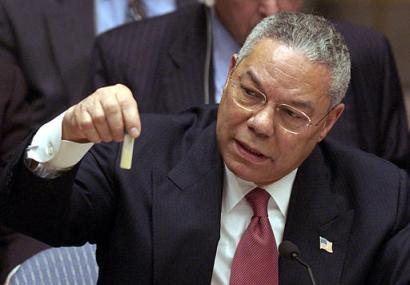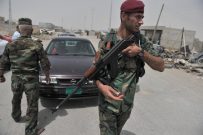Why Iraqi Chemical Weapons Embarrass the U.S. Government
The New York Times’ account of Washington’s embarrassed secrecy about the U.S. military’s encounter with several thousand chemical weapons in Iraq, and the often callous medical treatment provided to the troops who dealt with them during the 2003-20011 occupation, is incomplete.
Not mentioned by the Times is that our special operations forces had run into these weapons in 2002 during secret, pre-invasion reconnaissance missions under CIA operational command. At least one U.S. officer suffered kidney failure after coming upon a suspect site, ordering his men to stand back as he entered to check it out and collapsing upon exiting. Discharged on medical disability, he has been on dialysis awaiting a kidney transplant since 2004. He and other special forces were warned—more categorically than the occupying troops discussed by the Times—that divulging what happened to them would be treated as a serious breach of “top secret” security.
“Top Secret” is defined officially as “information the release of which would cause exceptionally grave damage to national security.” We should consider: Whom does the American people’s knowledge of the truth about these matters hurt? Whom and what did this secrecy protect? Just why did the U.S. government take pains—in an effort that continues to inflict pain—to pretend that things it knew to be true did not exist?
The short answer is: the internally politically conflicted, half-hearted and half-embarrassed, tentative, unserious manner in which our national security establishment operated then and operates now. Because our officials do things this way, avoiding embarrassment ends up being the default purpose of U.S. operations. This being so, brave troops end up being sacrificed as pawns of fearful bureaucrats.
The timing of C.J. Chivers’ story is part of the domestic partisan political struggle that has perverted U.S. policy. Chivers details the presence in Iraq of thousands of chemical weapons. But his point, that these were scrap rather than currently usable—the latter being what the Bush administration adduced in support of its decision to invade Iraq in 2003—follows the 2004 report by Charles A. Duelfer, a former U.N. official under contract to CIA. The Duelfer Report had argued that, because many of these weapons were buried and not in good condition, they were “not a secret cache of Weapons of Mass Destruction.” This report was a big part of the Democratic Party’s 2004 campaign. By running this story on the eve of another election, the Times recycles the issue.
Reality, however, is more complex and more damning. For everyone involved—except the U.S. service men who encountered these weapons, in many cases to their physical harm.
Recall that by early 2002, the Bush administration had realized that its overthrow of Afghanistan’s Taliban regime had done little to prevent another attack like that on New York and Washington the previous fall. The impetus for the September 11 outrage had come from the rampant anti-Americanism stoked by most of the regimes in the Sunni Arab world. Administration officials believed that, to reverse these regimes’ attitudes, it had to do something dramatic. Since Saddam Hussein had made himself the paladin of anti-Americanism; since he was running terrorist training camps and had ties with jihadis around the region; and since many in the Defense Intelligence Agency and in Vice President Cheney’s office believed he had had some hand in 9/11, Bush had decided to “do something” major against him.
But opposition from within the U.S. government was fierce and resulted in bitter, debilitating bureaucratic and partisan warfare. State Department and CIA officials— attached as they were, personally and (in the case of State) financially, to clients in Saudi Arabia and Iraq, and supported by the Democratic Party with increasing vigor—denied that Saddam’s Iraq was a proper target for the War on Terror. Through countless leaks of made-to-order intelligence estimates and internal memos, all of them magnified by the media, they went after President Bush.
The campaign included the demand that he appoint a special prosecutor to prosecute his administration’s presumed complicity in “outing” CIA officer Valerie Plame. This despite that the applicable law stated unequivocally that such an act was not punishable—and despite that the author of the deed was known to be anti-Bush Deputy Secretary of State Richard Armitage. Intimidated, Bush complied. This led to the jailing of journalist Judith Miller and the absurd felony conviction of Cheney aide Lewis Libby, both of whom were guilty of getting in the way of dishonorable behavior by the potentates of both political parties.
President Bush labored to get hold of a rationale that would placate bureaucratic and political opponents. By the spring of 2002, WMDs had become the leading candidate. Under orders, the CIA used military special forces to look for evidence. Its lack of enthusiasm about finding any, along with the intra-governmental turmoil, on top of the international illegality of U.S. armed forces roaming around a country with which we were officially at peace, led to treating these missions as “Top Secret” and those who executed them as pawns.
In the balance of low, urgent, squalid concerns on the part of high officials of both parties, and their media allies, what is the value of a brave officer’s kidneys, or of any ordinary person’s life?
Chivers quotes the spokesman for the current Secretary of Defense:
The secretary believes all service members deserve the best medical and administrative support possible. . . . His expectation is that leaders at all levels will strive to correct errors made, when and where they are made.
To believe that this cool solicitude extends beyond the cases upon which public attention now focuses, or that it will outlast that attention, is to imagine that our bipartisan ruling class is something other than what we experience daily.



